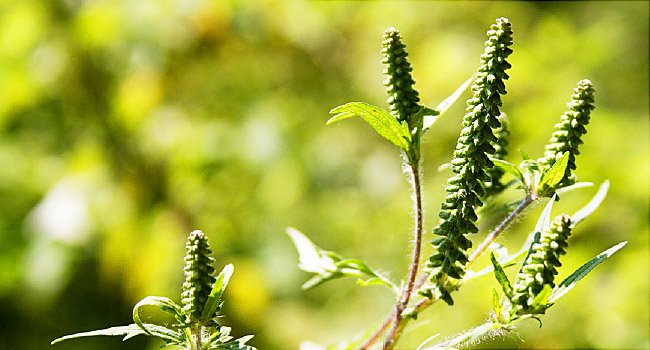The primary allergen during the fall allergy season, which can start as early as August, is ragweed pollen. A ragweed plant lives only one season, but it is very powerful. A single plant can produce up to 1 billion pollen grains. These grains are very lightweight, float easily through the air, and may travel a significant distance.
Allergies occur when the body’s immune system treats an allergen, such as ragweed, like a foreign invader. This starts a chemical reaction that produces and sends histamine throughout the bloodstream causing allergy symptoms.
Symptoms of ragweed allergy are similar to those of other pollen allergies including:
• Sneezing
• Runny nose
• Nasal congestion • Headaches
• Irritated eyes • Itchy throat
The best way to control your allergy is to minimize contact with the pollen. However, it may be difficult to avoid this airborne pollen during the season. While there is no cure for ragweed allergy, it can be managed. Receiving the correct diagnosis is the first step in managing your symptoms. Your allergist will give you a physical exam, ask about your health and symptom history, and perform allergy testing to determine exactly what you are allergic to.
Remember that pollen can get into your home via your clothes, your hair, or your pet — so change your clothes after being outside for long periods, shower before going to bed, and wipe down any animal that has been outside. Also, keep your windows closed at all times, both at home and in the car.
People allergic to ragweed are also often sensitive to certain foods. This is because some plants can contain pollen that is similar to ragweed. This condition is known as Oral Allergy Syndrome, or Food Pollen Allergy Syndrome. Some foods that may cause symptoms in a person with a ragweed allergy include bananas, cantaloupes, chamomile tea, cucumber, honey that contains pollen, sunflower seeds, or zucchini. These patients may experience itching or tingling in the mouth and throat. Your allergist can help determine if you are experiencing this cross-reactivity.
Ragweed allergy can be treated with antihistamines, nasal corticosteroids, and other OTC or prescription medications. Your allergist/immunologist may also suggest a treatment plan that will, over time, significantly reduce the frequency and severity of symptoms caused by allergic rhinitis. Ask our experts about allergy immunotherapy to change your immune system's response to your allergies.
Schedule an appointment with one of AllergySA’s experienced medical providers by calling (210) 616-0882. Allow us to assist you in determining which allergens are causing your symptoms.
Share this entry
-
Share on Facebook
Share on Facebook
-
Share on Twitter
Share on Twitter
-
Share on WhatsApp
Share on WhatsApp
-
Share on Pinterest
Share on Pinterest
-
Share on LinkedIn
Share on LinkedIn
-
Share on Tumblr
Share on Tumblr
-
Share on Vk
Share on Vk
-
Share on Reddit
Share on Reddit
-
Share by Mail
Share by Mail



.png?width=80&height=80&name=Untitled%20design%20(19).png)